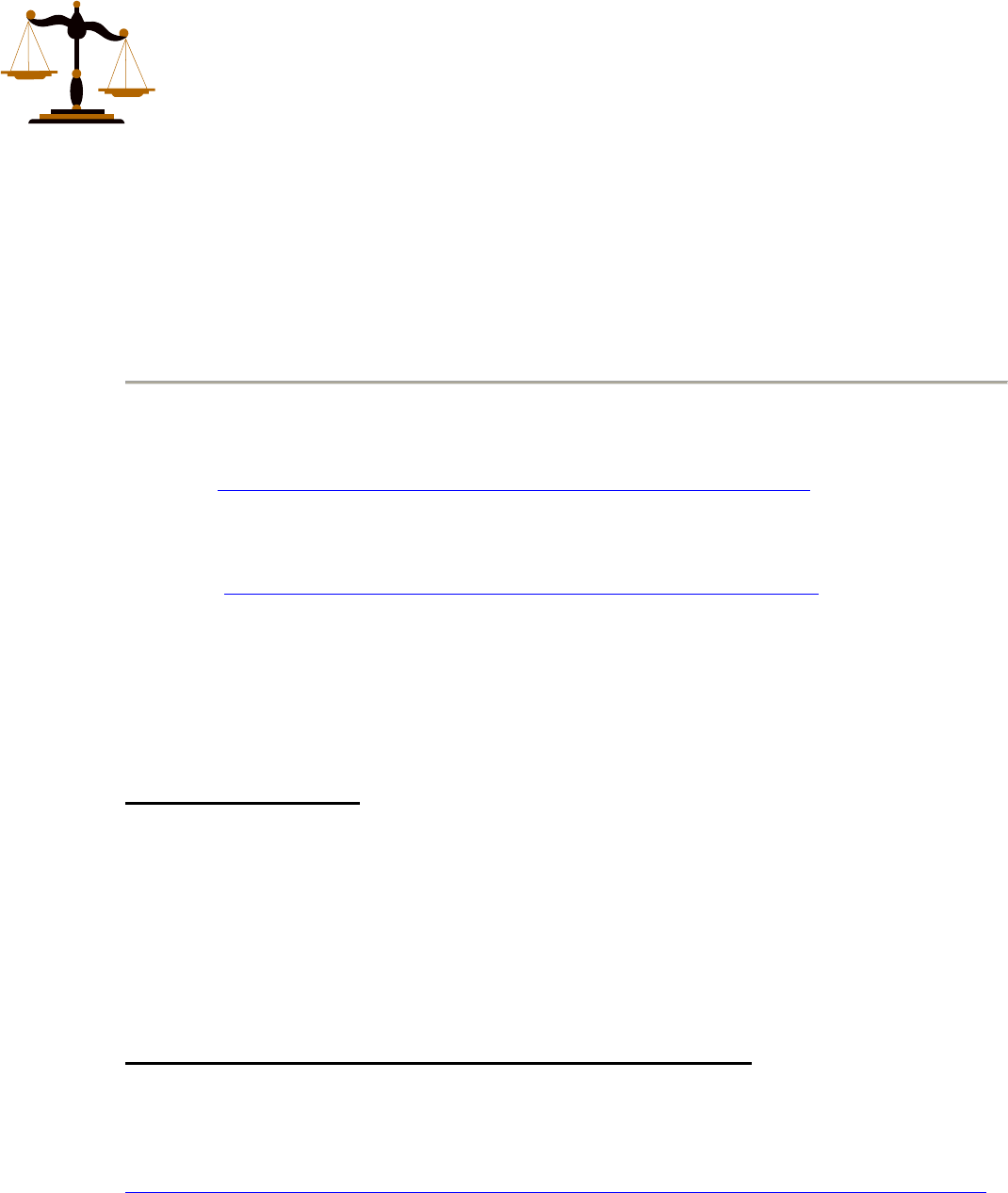
1
LEGAL BRIEF
FORECLOSURE ON RENTAL PROPERTY
JANUARY 2016
PREPARED BY
NELLIS LAW CENTER, 4428 England Ave (Bldg 18), Nellis AFB, Nevada 89191-6505
702-652-5407, Appt. Line 702-652-7531
If you rent property you suspect may go into foreclosure, there are resources you may use to
verify the foreclosure. One of those resources includes the Clark County Assessor website
located at http://www.clarkcountynv.gov/Depts/assessor/Pages/default.aspx . Once on the
website, click “PROPERTY RECORD SEARCH” which allows you to search by parcel number,
owner name, or address. You can get information on the property, including the exact address
and parcel number. You will need this information when you go to the Clark County recorder
website at http://www.clarkcountynv.gov/Depts/recorder/Pages/default.aspx . This website will
give you detailed information regarding the property, including any actions pending against it.
For more information, contact the Recorder’s Office at (702) 455-4336.
In addition, a renter can place a “foreclosure clause” in their lease requiring a landlord who is
delinquent in mortgage payments to notify the tenant of the delinquency and allow the tenant to
cancel the contract (see example below).
CURRENT NEVADA LAW:
Under previous Nevada state law, if you are renting a dwelling unit which is foreclosed upon,
you could be served with a notice requiring you to leave within 3 days. If you did not leave, the
new owner could file an eviction action against you. This law, however, has been replaced by
federal law – see Helping Families Save Their Home Act of 2009, below.
Starting 01 October 2009, Nevada law allows you to move at any time after the owner has
received a notice of default and election to sell.
HELPING FAMILIES SAVE THEIR HOMES ACT OF 2009, P.L. 111-22.
President Obama signed this bill into law on May 20, 2009. The bill includes a nationwide 90
day pre-eviction notice requirement for tenants in foreclosed properties. Below are common
questions and answers on the law. This information can also be found at
http://www.clarkcountycourts.us/CivilSHC/landlord-tenant-evictions/eviction-foreclosure.html .

2
Can the person, bank or other institution who buys the building at foreclosure make me
leave right away?
No. The new owner needs to end your tenancy by giving you a notice to leave of at least 90-
days. If you have an unexpired lease, you may be able to stay until the end of the lease.
What can I do if the new owner says I have to leave in less than 90 days?
You can send a letter telling the new owner about the law. See the sample letters at the end of
this handout.
o Keep a copy of the letter you send.
o It may help to go to the post office and pay for a return receipt to make the new owner
sign to prove they got your letter.
o If you get a green receipt signed by the new owner in the mail, save it.
You must also offer to pay the new owner your rent and live up to the other terms of your lease.
What can I do if the new owner serves me with a notice to leave within 3 days?
You should contact a lawyer immediately. Refer to the Legal Brief on Lawyer Referral Services
for further information on how to contact a lawyer.
If you unable to contact a lawyer, call the new owner immediately. Tell the new owner about the
law and say that you are entitled to at least a 90 day notice. State that if the new owner tries to
evict you that you will defend based on the new law.
What happens if I don’t pay the new owner rent or violate other terms of my lease?
If you are late with your rent, the new owner can send you a notice giving you 5 days to pay,
move or file an affidavit with justice court explaining that that you have a legal excuse not to
pay. See How To Respond To An Eviction Notice/ Non-Payment of Rent link If you violate
other terms of your lease the new owner can send you a notice stating that you either “cure” the
breach of the lease or move within 5 days. If you don’t cure and have not moved within 5 days,
then the new owner can send you a notice giving you 5 days to move or file an affidavit with
justice court explaining that that you have a legal excuse not to move.
What if I have a lease that has more than 90 days left?
In most cases, the new owner cannot evict you until the end of the lease. There are two
exceptions.
o If the new owner wants to use your home as their primary residence, the new owner only
has to give you a 90-day notice to leave after they become the owner.
o If you do not pay your rent or violate other terms of my lease the new owner may evict
you as described above.

3
What must the 90 day notice say?
The new federal law applies to both single family homes and large apartment complexes. It also
applies to weekly as well as monthly rentals. It does not specify what the notice should say.
Effective 10/1/09, NRS 40.255 creates additional notice requirements for “residential (4 units or
less) foreclosures” of dwellings rented by the month or longer. The 90 day period should be
contained in a notice of change of ownership which must include a statement:
(a) Giving the contact information for the person to whom rent should be paid;
(b) Notifying you that the rental agreement with the previous owner or landlord
continues in effect through the notice period, and
(c) Notifying you that failure to pay rent or comply with any other term of the
agreement or applicable law constitutes a breach of the rental agreement and may result
in eviction proceedings.
For larger complexes and dwellings of all sizes rented for periods shorter than 30 days no
specific form of notice is required. For both “residential foreclosures” and large complexes the
notice must allow you the time required to move under the new federal law. If the new federal
law is not extended by Congress, state law notice periods will govern.
What if I do not want to stay 90 days or for the remainder of my lease?
Effective 10/1/09, NRS 40.255 following “residential (4 units or less) foreclosures” of dwellings
rented by the month or longer, tenants may vacate at any time during the notice period without
penalty. No record of eviction may be entered if you vacate within the notice period.
In any case, you may be able to negotiate to see what the new owner might offer if you agree to
move early. Many banks which foreclose may offer you a “cash for keys” option.
What if I wish to continue renting the dwelling?
You may be able to negotiate to see what the new owner might offer you a new lease or agree
that you can remain longer than 90 days.
When should I first be informed that my dwelling is in foreclosure?
For most tenants the 90 day notice should come as no surprise. Starting 10/1/09, NRS 107.087
requires for “residential (4 units or less) foreclosures” that at the same time the lender serves the
owner (your landlord) with a “notice of default and election to sell,” that you get written notice
which allows you to break the lease and move at any time. This notice should come at least 90
days prior to the foreclosure sale, but no less than 15 days prior. That notice must also describe
your rights and responsibilities under Nevada eviction procedures. The notice must be both
posted on the property and mailed to you.
The separate notice must be similar to the “Notice to Tenants of the Property” found at the end of
this brief, which describes a tenant's rights in the event of a mortgage foreclosure.

4
What can I do if the new owner serves me with a summons and complaint asking a court to
evict me without giving me notice?
You should contact a lawyer immediately. Refer to the Legal Brief on Lawyer Referral Services
for further information on how to contact a lawyer.
If you unable to contact a lawyer, go to the Clerk of the court on the summons and complaint
immediately. File an answer with the court that says the new owner failed to give the notice
required by the Protecting Tenants at Foreclosure Act, Pub. L. No. 111-22, §702 (2009). You
may obtain a form answer with instructions from the Clark County court.
Go to court on the date the court sets for a trial and take with you:
1. the copy of your letter to the new owner,
2. the green return receipt, if you received one,
3. the copy of the new law that is attached to this notice and
4. a copy of your lease, if you have one.
What can I do if a sheriff or constable arrives at my door to evict me?
Tell the sheriff or constable that if you received no eviction notices or you were not served with a
summons and complaint. Ask for time to go to court to get the order evicting you set aside.
You should contact a lawyer immediately. Refer to the Legal Brief on Lawyer Referral Services
for further information on how to contact a lawyer.
If you unable to contact a lawyer, go to the Clerk of the court on the eviction order immediately.
Say that you want to file an emergency motion to vacate the eviction order.
What happens to my security deposit?
The previous owner is required by NRS 118A.244 to either (a) return your security deposit or (b)
transfer it to the new owner.
What if I am a section 8 tenant?
You have all of the rights listed above regarding your lease and the requirement that the owner
give you a 90-day notice to leave.
You also have additional protections.
o The Section 8 Housing Assistance Payment contract continues.
o The foreclosure is not a lawful reason to terminate your lease.
Call your Section 8 worker and tell the worker what is happening. You can also send a letter
telling the new owner about the law. See the sample letters at the end of this brief.

5
What can happen if I do not leave by the end of the notice period?
If you do not leave voluntarily or enter into an agreement which allows you to stay, the new
owner may evict you at the end of the notice period (90 days or the expiration of the lease). To
evict you the new owner must serve you with a summons and complaint.
The Service Member Civil Relief Act (SCRA) is also a resource; however, SCRA provides
only limited protection to service members from foreclosure. The SCRA, Section 531, states
that a landlord or anyone else with paramount title (i.e. banks) cannot evict service members
from their private residences without a valid court order. A court order will only be issued if the
service member is served notice and had an opportunity to respond. After being served a notice
of eviction, a service member may file an application with the court to delay the execution of the
eviction for a period of approximately 90 days. This protection is limited to residential leases
where the monthly rent does not exceed $3,217.81 for 2014 (adjusted annually based on the
Consumer Price Index).
THE INFORMATION CONTAINED IN THIS PAMPHLET IS OF A GENERAL NATURE AND
IS PROVIDED FOR YOUR ASSISTANCE AND CONVENIENCE. IT IS NOT INTENDED AS
LEGAL ADVICE AND IS NOT A SUBSTITUTE FOR LEGAL COUNSEL. IF YOU HAVE ANY
QUESTIONS AS TO HOW THE LAW IN THIS AREA AFFECTS YOU OR YOUR LEGAL
RIGHTS, CONTACT A CIVILIAN ATTORNEY OR THE NELLIS AIR FORCE BASE LEGAL
OFFICE FOR AN APPOINTMENT WITH A LICENSED ATTORNEY.

6
SAMPLE LETTERS
SAMPLE LETTER FOR NON SECTION 8 TENANT TO SEND TO NEW OWNER
Date: _________________
To: (Name and address)
Dear Landlord,
I am writing this letter in response to the notice of termination dated _________.
The Protecting Tenants at Foreclosure Act, Pub. L. No. 111-22, §§ 701-704 (2009), which
became law on May 20, 2009, applies to state eviction proceedings.
This act requires that a new owner who took title to residential rental property through
foreclosure must honor existing leases until the end of the lease term.
There are three exceptions to this rule: 1) if there is an existing term lease and the new owner
wants to occupy the foreclosed property as a personal residence before the end of the lease term,
2) if there is an existing term lease with less than 90 days to the end of the lease term, or 3) if the
existing lease on the foreclosed property is a month-to-month tenancy or a tenancy at will. In
each of these cases, the owner must provide the tenant at least 90 days notice to terminate the
tenancy.
Because the notice sent on __________does not comply with this law, I ask that you rescind
(withdraw) the notice.
Sincerely,
________________
Tenant name
Sample Letter for Section 8 Tenant to send to the Landlord
(Name and address of tenant)
(Name and address of owner)
Date:
Dear Landlord,
I am writing this letter in response to the notice of termination dated _________.
The Protecting Tenants at Foreclosure Act, Pub. L. No. 111-22, § 702 - 703 (2009), that became
law on May 20, 2009, applies to state eviction proceedings. This law requires a person or entity

7
who acquires ownership of residential rental property through foreclosure to take subject to (be
legally bound by) the Section 8 voucher lease and Housing Assistance Payments (HAP) contract.
A new owner can only terminate the lease and HAP contract by giving the tenant at least 90 days
notice of termination prior to the end of the lease. If the Section 8 lease and HAP contract have
less than 90 days remaining in their term, or if the new owner who takes title at foreclosure
wants to occupy the premises as his or her personal residence, the new owner may terminate the
lease only after giving the tenant at least 90 days notice of such termination.
Because the notice sent on __________falls short of the 90-day notice required by law, I ask that
you rescind (withdraw) the notice.
Sincerely,
_______________
Tenant name
SAMPLE FORECLOSURE CLAUSE:
THE LANDLORD AGREES to notify the tenant if the landlord is delinquent in mortgage
payments or this property is in ANY stage of foreclosure. The landlord’s notice to the tenant
must be in writing and either sent by certified mail or posted on the front door of the rental
property. The landlord must provide this notice within five (5) calendar days of the landlord
becoming delinquent or receiving notice the property is subject to foreclosure. Tenant has the
absolute right to terminate this lease if the landlord is delinquent or the rental property is in any
stage of foreclosure. Tenant must give the landlord notice in writing; the termination will be
effective 30 days from the tenant’s written notification to the landlord. The 30-day period
allowed under this clause trumps any conflicting termination periods found elsewhere in this
lease agreement. Termination under this clause is without penalty.
THE LANDLORD FURTHER AGREES, that upon termination of this lease under this
clause, landlord will surrender, on the last day of tenant’s occupancy, all prepaid rent and all
security and pet deposits paid by the tenant. It is agreed that surrender of these monies will be
in full (i.e., the exact amount paid by the tenant without any deduction). Finally, the landlord
agrees that, if the tenant chooses early termination under this clause, landlord will be liable to
the tenant for the tenant’s reasonable costs of location similar housing elsewhere and the
reasonable costs incurred by the tenant to move to the new place.
